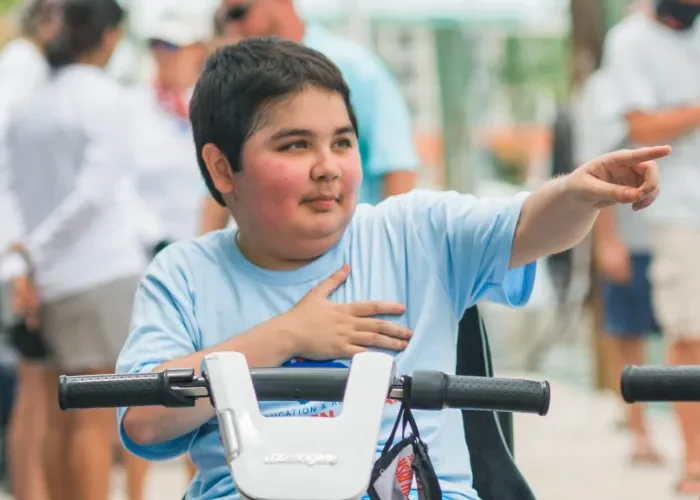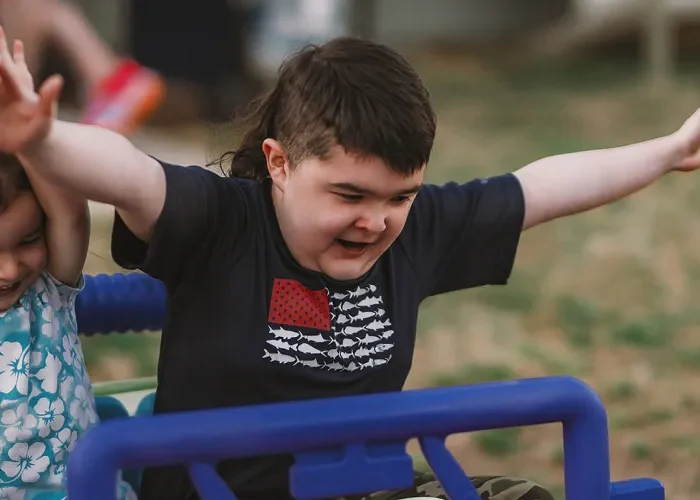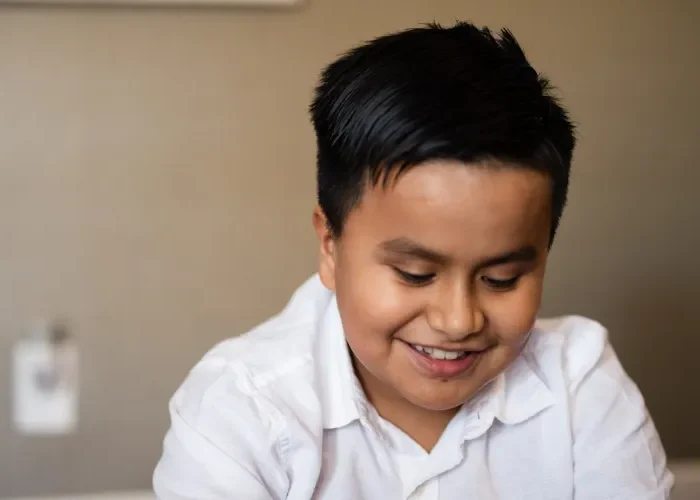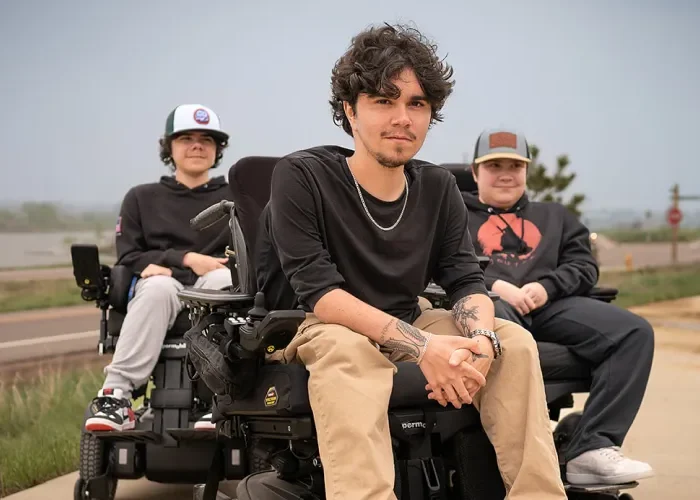Lucas gives the nod as two assistants lift him over to the edge of the Tropical Serenity, placing him on a dive platform just above the water. His legs dangle into the surf as an assistant returns to grab his scuba setup from the deck. Lucas looks out across the horizon as the ocean swells rock the boat steadily. The overcast weather off the coast of Key West seems ominous today, but so far so good. A diver waits for him in the water below.
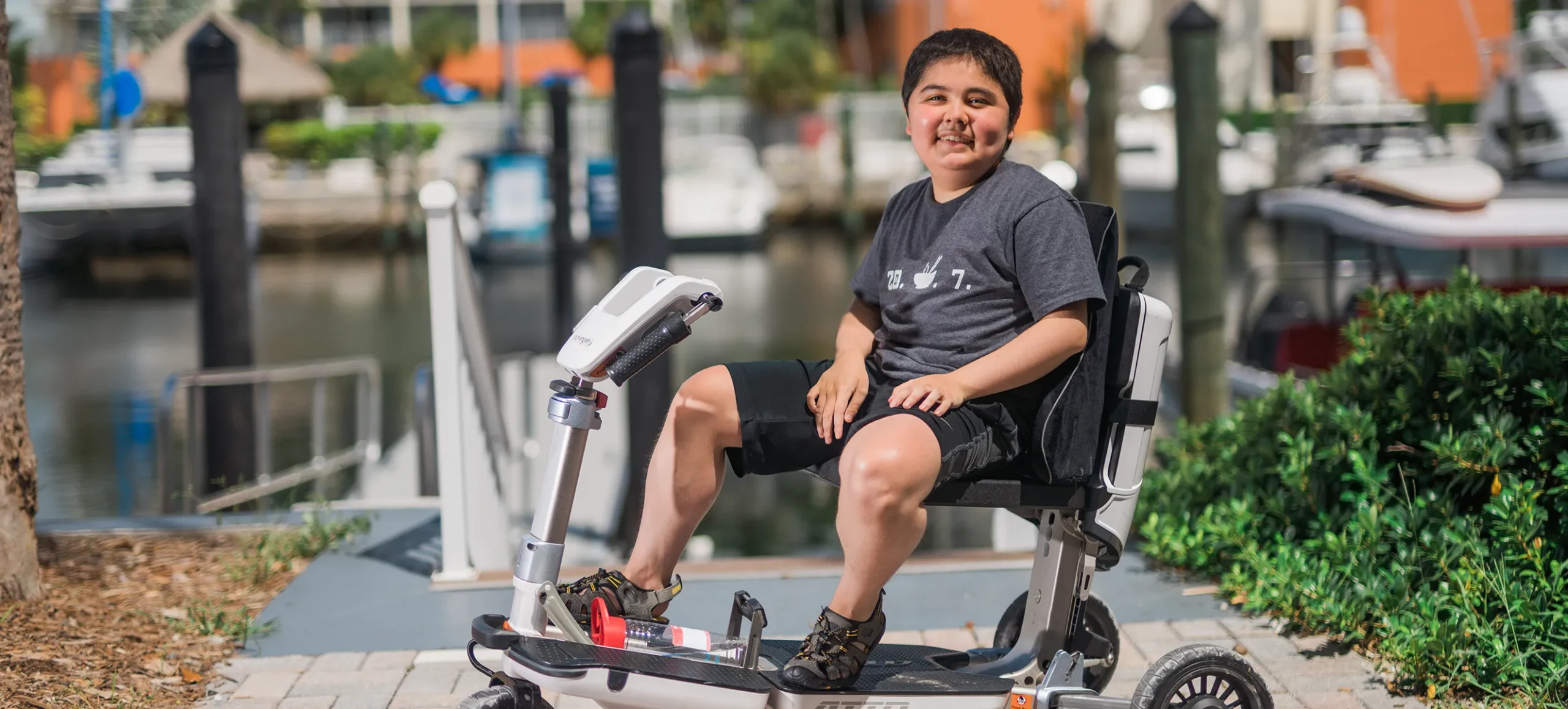
His assistant returns with the BCD (buoyancy control device), weight belt, and regulator setup. He fits the BCD over Lucas’ arms and checks all the hoses. The building anxiety of the hours that led to this moment is about to release. Lucas puts the regulator into his mouth and breathes deeply. The mask is fit tightly over his eyes as he readies to take the plunge.
With a guiding push, his body is immersed in the tropical ocean water. Alongside him are two dive buddies who quickly review their hand signals for the dive. The divers are specially certified in adaptive diving—a burgeoning field that seeks to share the scuba experience with people of all abilities. Throughout the undersea exploration they will be there to provide specific types of support. “He needs help clearing his nose,” explains Karla, his mother, who waits on the shore “He has to clear it as he descends. One of his dive buddies will reach over and squeeze his nose for him.” Lucas disappears beneath the surface to explore the coral reef below. His dive buddies continue to guide him, using their collective strength to keep Lucas correctly positioned against the current.
Lucas lives with Duchenne muscular dystrophy (DMD), a disease that progressively weakens his muscles as he grows—taking away physical abilities he possessed when he was younger. The disorder provides no lack of frustration for the teenager. He recently lost the ability to walk, so the opportunity to move freely in the water, without the encumbrance of gravity, feels liberating. “I’m fully able-bodied underwater,” he says. “Being underwater is really good for me.”
However, building the courage to dive in the open ocean has been a task in itself. “When I first started diving, I didn’t know what to make of it at all,” says Lucas. “I wasn’t sure I wanted to. It freaked me out that I was underwater. But after my first time, I wanted to go again immediately.” Mishaps and fears aside, Lucas is stoked on diving and is especially keen on the educational tutorials that accompany his excursions.
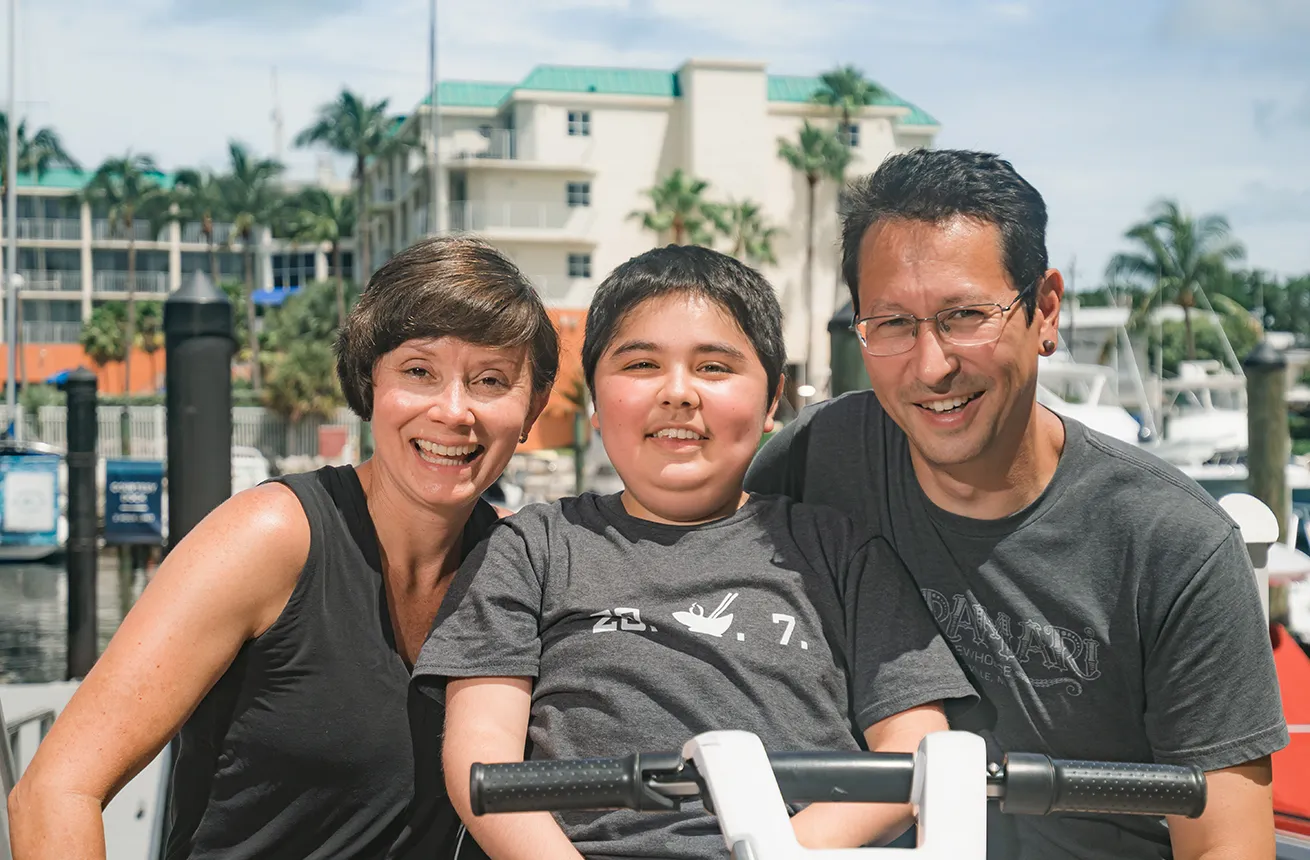
His parents, Dave and Karla, vicariously share the anticipation, the nervousness, and excitement of Lucas’ dive from shore. Over the past few years, they have sought out adaptive dive camps for Lucas, prioritizing his experience in the water, and at times, have been able to join him. “Scuba offers this amazing opportunity to re-find adventure as a family,” says Karla. She and Dave first got into diving before Lucas was born and now primarily support him in getting to experience a sport that has made accommodations so that individuals with disabilities can participate. In fact, Dave is working toward his own certification in adaptive diving, so that he can accompany his son in the future.
Adaptive diving is just one example of this family’s determination to keep the thrill alive. Seeking adventure is a deeply instilled family value, which has pushed Lucas to see and experience the world firsthand, while getting a decent adrenaline rush. He has gone paragliding off the top of a mountain, skied down others with adaptive skis, parasailed over the ocean, ridden in a motorcycle sidecar, and traveled extensively—fostering a deep respect and appreciation for the world he lives in. For his parents, it is a continuation of the lives and the dreams that they always thought they would live and have continued to fight for as they come to terms with the circumstances they’ve been dealt.
Karla and Dave both hail from distinct backgrounds, but were brought together in part, through the sport of rock climbing. “I was a lead climber,” says Karla. Dave, on the other hand, was into bouldering. “I wouldn’t say I’m afraid of heights,” he says. “I’m more afraid of falling.” They met at a climbing gym near Silver Spring, Maryland—the area where Dave grew up and where the family lives today. Karla quickly fell for Dave’s eccentric sense of humor, which he continues to exude at any moment. The son of two classical musicians, Dave excelled in school before starting a career in digital information security.
Karla was a bird of a very different feather. She was raised in rural Oklahoma near the Chickasaw Nation, of which she and Lucas are tribal members. As a young woman, Karla developed a strong wanderlust, and she left her small rural town to study abroad in Spain. The world opened up to her then, in a big way. Her host family became an integral part of her life and something she knew she wanted to share with Lucas after he arrived on the scene. She insisted on raising him bilingually and brought Lucas to Spain numerous times to visit her host family.
“We had a blast as new parents,” says Karla. Lucas filled her and Dave with a strong desire to share their passions and have as much fun as possible. Although Lucas had never been very agile or athletic, nothing concerning occurred until his preschool teacher called Karla one day to say something was off. Karla took Lucas to his pediatrician who recommended they visit a neuromuscular specialist. The neurologist observed Lucas, but hesitated to say anything definitive. Lucas and Karla were about to leave on a month-long trip to Spain.
It was in Spain that Karla was confronted by painful questions about Lucas’ condition. “On that trip I have many memories of Lucas running and falling,” she remembers. He got bruises on his head that protruded like two horns. Her host father noticed that Lucas seemed to have trouble walking and asked Karla about it. “I said, ‘I don’t know, I just know he gets tired… I started doubting myself. Was I doing something wrong? Is something wrong with him? What’s happening?”
“There were a lot of indicators,” admits Dave, who joined them for the final week. “As parents, we were good at ignoring signs that were kind of scary.” Soon after returning to the US, Lucas went to an appointment at the National Children’s Center in Silver Spring. “The doctor told us, ‘I’m 90% certain your son has something called Duchenne muscular dystrophy,’” remembers Karla. “I was like a deer in the headlights.” Shocked, she and Dave refused to break down, holding on to hope that there was a way to solve the problem. “It took quite a while to process,” says Dave. “We came to terms with one thing pretty quickly: We’re not in control as much as we’d like to be. That’s usually the determination that keeps you from going nuts as a parent.”
Dave and Karla rapidly educated themselves and found important resources in the vast and well-connected Duchenne community online. There, Karla and Dave met other Duchenne parents and entered into the web of patient foundations, conferences, and events—all sources for good advice. Now, Karla uses the online platform to raise awareness and funds for new initiatives. “I had no idea the family I would get because of this disease,” she says. “And the dear friends that we’ve made because of it. You become part of a rare community that you never would’ve chosen.”
For Lucas, this has meant that recommendations and access to medicine and therapy have come easier. He even got a chance to be part of a clinical trial, and despite that therapy’s lack of positive data in the end, he developed an immense appreciation for the work that is going on to treat and cure the disease. “Please do this,” he says, imploring the researchers and clinicians working on Duchenne. “I don’t want to be like this for my whole life. I want to experience what other people normally get a chance to do. I want to walk again.” He and his parents stay up to date on drug development, keeping abreast of the newest research in hopes that a breakthrough comes soon.
Losing the ability to walk is a recent and major milestone in Lucas’ journey with Duchenne, and regaining that ability is currently his top priority when it comes to the potential impact of new therapies. It signaled his transition to using his scooter full-time and asking for assistance more. However, when he’s with friends, he barely notices that he’s any different and is able to get around with their help. “Since I know a lot of people, it’s less of an issue,” he says. “People know I need help.”
Early on, after his diagnosis, Karla and Dave decided that even with increasing mobility challenges, Lucas could still do what he wanted, with accommodations and the right attitude. “We can still do a lot of things together,” says Dave. “It’s just figuring out how to do them with some of the challenges. How to negotiate them.” Keeping this spirit alive and healthy also adds to the notion that Lucas is going to do everything he can while he can, acknowledging that the progression of the disease is far from over, but that time, however finite, will be spent intentionally.
With the COVID pandemic, both Dave and Karla began working from home, allowing them to take a more active role in caring for Lucas through what has been a time of great transition. The “mixed blessing” of COVID has, at least for now, allowed the family to provide more support and spend more of their days at home, together. “We all want more time,” continues Dave. “It’s just that our time is more constrained. We are going to make the most of what we do have, but I do want a little more.”
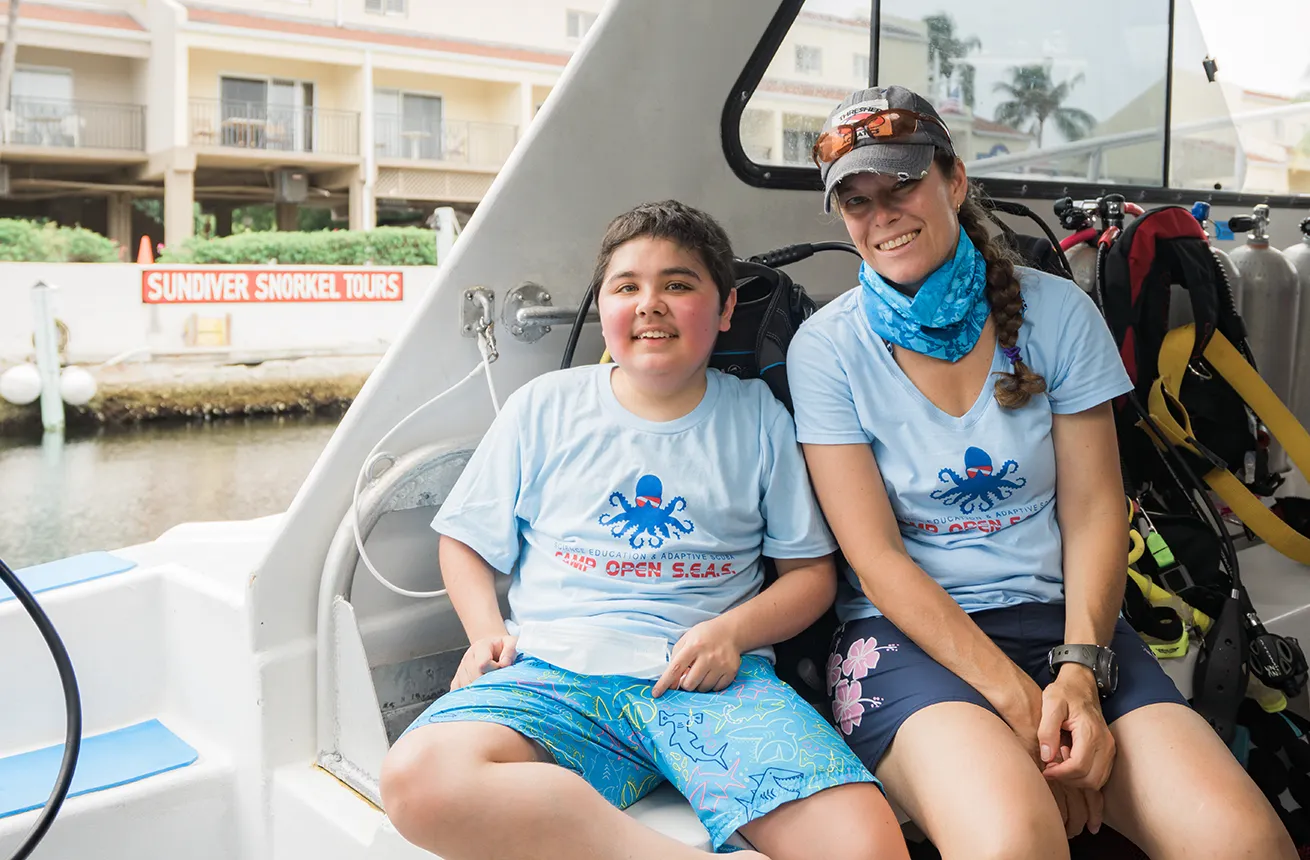
Lucas resurfaces from the depths, his head bursting out into the air after several minutes under water. He’s opted to return a little earlier than planned. A recent sternum injury has been nagging him, and along with a tight-fitting BCD, it proved too painful to deal with for long. He’s helped back on the deck of the boat by assistants who support the weight of the massive air tank on his back. However brief his underwater visit was, the richness and diversity of the coral reef is inspiring and something he looks forward to returning to when he can. His fascination with ocean life and desire to be part of it will not be easily quenched.
The winds begin to pick up as the Tropical Serenity returns to port. Lucas is helped onto the dock and onto his scooter, but not before his parents give him a good squeeze. “I got to see a parrot fish!” Lucas exclaims. The forecast for tomorrow isn’t great, but Lucas isn’t concerned about that. His tummy is grumbling—he’s ready for dinner. Perhaps the most ardent driving force for adventure in his family is the urge to explore the diverse cuisines of the world. “I think food is the only thing that motivates me,” says Lucas, half-joking. His love of Thai food brought him all the way to Thailand, and he has trips planned to Italy and New Orleans—also inspired by gastronomy but delayed due to the COVID pandemic.
Tonight, they’ll need to find something to eat a bit closer. After a long and somewhat trying day, they embrace all that has been granted them by life—a strong family, adventurous hearts, and the will to keep moving forward. “This is a journey that won’t always be pleasant,” reflects Dave. “It’s something we can adapt to. We want to move beyond morbid conversations and get back to living life.”
